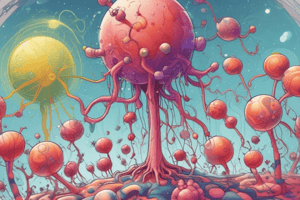Podcast
Questions and Answers
What is the definition of antibody affinity?
What is the definition of antibody affinity?
- The strength of interaction between an antigen and all the binding sites on an antibody
- The equilibrium constant that describes the antigen-antibody reaction
- The sum of attractive and repulsive forces between an antigenic determinant and a single combining site on the antibody
- The force of interaction between an epitope and an antibody’s antigen binding site (correct)
What are the forces involved in forming antigen-antibody interactions?
What are the forces involved in forming antigen-antibody interactions?
- Hydrogen bonds, hydrophobic interactions, electrostatic and van der Waals forces (correct)
- Ionic bonding and permanent biomolecular interactions
- Electrochemical bonds and reversible biomolecular interactions
- Covalent bonds and irreversible biomolecular interactions
Which factors can affect antibody affinity?
Which factors can affect antibody affinity?
- pH, blood pressure, and humidity
- Temperature, light exposure, and oxygen levels
- pH, temperature, and buffer composition (correct)
- Salinity, air pressure, and radiation levels
What is the difference between antibody affinity and avidity?
What is the difference between antibody affinity and avidity?
What does antibody avidity refer to?
What does antibody avidity refer to?
What does antibody affinity measure?
What does antibody affinity measure?
What are the forces involved in forming antigen-antibody interactions?
What are the forces involved in forming antigen-antibody interactions?
Which factor does not affect antibody affinity?
Which factor does not affect antibody affinity?
What is the basis for antibody specificity and cross reactivity?
What is the basis for antibody specificity and cross reactivity?
How is avidity of an antibody defined?
How is avidity of an antibody defined?
What is the equilibrium constant that describes the Ag-Ab reaction?
What is the equilibrium constant that describes the Ag-Ab reaction?
What type of interactions are antigen-antibody interactions based on?
What type of interactions are antigen-antibody interactions based on?
Which of the following factors can affect antibody affinity?
Which of the following factors can affect antibody affinity?
What is the sum of the attractive and repulsive forces operating between the antigenic determinant and the combining site of the antibody called?
What is the sum of the attractive and repulsive forces operating between the antigenic determinant and the combining site of the antibody called?
What term describes antibodies being bivalent to multivalent due to having at least two antigen-binding sites?
What term describes antibodies being bivalent to multivalent due to having at least two antigen-binding sites?
Flashcards are hidden until you start studying
Study Notes
Antibody Affinity and Avidity
- Antibody affinity refers to the strength of binding between a single antibody-binding site and an antigenic determinant.
- Antibody affinity measures the strength of binding between a single antibody-binding site and an antigen.
- Antibody affinity is affected by factors such as pH, temperature, and ionic strength.
- Hydrogen bonds, ionic bonds, van der Waals forces, and hydrophobic interactions are the forces involved in forming antigen-antibody interactions.
- Antibody affinity differs from antibody avidity, which refers to the overall strength of binding between a multivalent antibody and an antigen.
Antibody Avidity
- Antibody avidity describes the cumulative strength of binding between multiple antibody-binding sites and an antigen.
- Avidity is defined as the sum of the attractive and repulsive forces operating between the antigenic determinant and the combining site of the antibody.
Antibody Specificity and Cross Reactivity
- The basis for antibody specificity and cross-reactivity lies in the shape and chemical properties of the antigenic determinant and the antibody-binding site.
Ag-Ab Reaction
- The equilibrium constant that describes the Ag-Ab reaction is the dissociation constant (Kd).
- Antigen-antibody interactions are based on non-covalent interactions.
Antibody Structure
- Antibodies can be bivalent to multivalent due to having at least two antigen-binding sites, which is described by the term valency.
- The valency of an antibody does not affect its affinity.
Studying That Suits You
Use AI to generate personalized quizzes and flashcards to suit your learning preferences.




